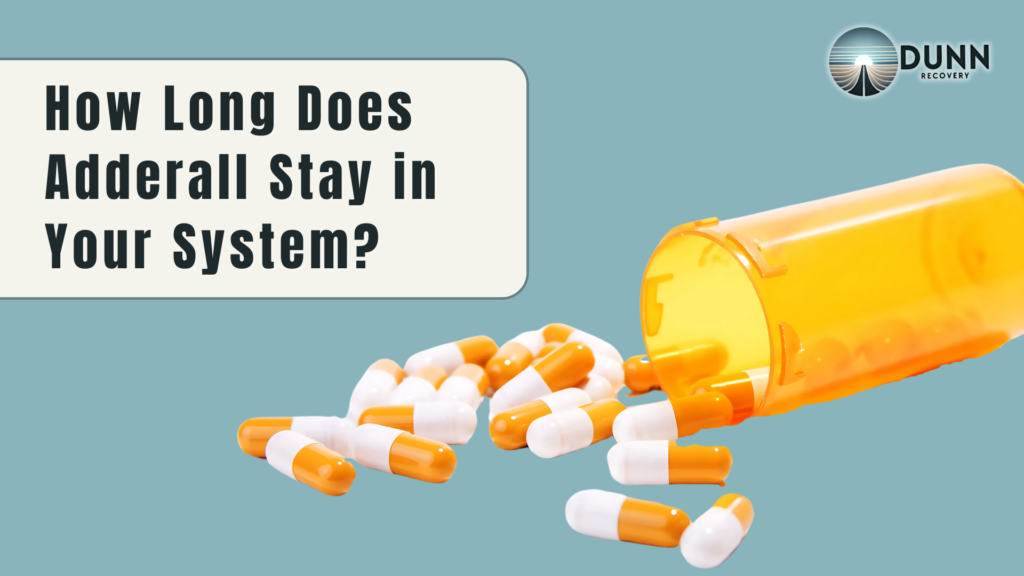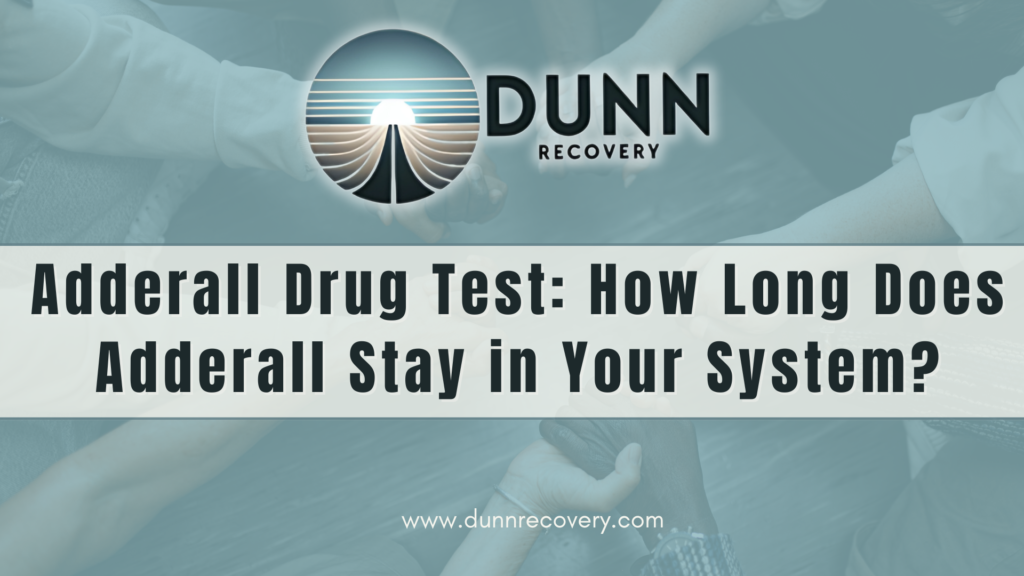When prescribed medication intersects with drug testing protocols, patients often find themselves navigating complex territory. At Dunn Recovery, we understand the importance of providing clear, accurate information about substances like Adderall and how they interact with drug testing procedures. This comprehensive guide focuses specifically on the critical question many patients ask: “How long does Adderall stay in your system for a drug test?” We’ll explore detection windows across different testing methods, factors that influence detection times, and practical information for anyone facing an Adderall drug test.
Understanding Adderall and Its Detection in Drug Tests
Adderall is a prescription stimulant medication containing amphetamine and dextroamphetamine, primarily used to treat attention-deficit/hyperactivity disorder (ADHD) and narcolepsy. As a controlled substance, Adderall appears in standard drug screenings, which can create confusion for legitimate prescription holders.
When it comes to drug testing, understanding the adderall half life is crucial. The half-life refers to the time it takes for half of the drug’s active substance to be eliminated from your bloodstream. For immediate-release Adderall (IR), the adderall half life ir typically ranges from 9-14 hours, while Adderall XR (extended-release) has a longer elimination period.
An adderall urine test is the most common screening method, but blood, saliva, and hair tests may also detect the medication. Each testing method has different detection windows, which we’ll explore throughout this article.
How Long Does Adderall Stay in Your System? Detection Windows Explained

The central question we encounter at Dunn Recovery is “how long does adderall stay in your system drug test?” Understanding detection windows is crucial for anyone taking this medication who may face testing. The answer varies based on several key factors, including:
- Type of Adderall (immediate-release vs. extended-release)
- Dosage amount
- Frequency of use
- Individual metabolism
- Age and overall health
- Kidney and liver function
- Urine pH levels
For most people, here’s a detailed breakdown of how long does adderall stay in your system for different testing methods:
- Blood: 24-48 hours
- An adderall blood test provides the shortest detection window
- Most accurate for determining current active drug levels
- Typically used in medical or emergency settings, not routine screenings
- Urine: 2-4 days
- Most common testing method for adderall drug test scenarios
- Adderall urine test may detect metabolites slightly longer in chronic users
- Adderall levels in urine test can confirm recent use but not impairment
- Saliva: 24-72 hours
- Less commonly used but increasingly popular for workplace testing
- Non-invasive collection method
- Detection window varies based on oral pH and hydration
- Hair: Up to 90 days
- Longest detection window of all testing methods
- Cannot determine when use occurred within that 90-day period
- Less commonly used for adderall drug test purposes
The timeline for how long does adderall stay in your system for a drug test depends primarily on which testing method is being used. Most standard drug panels rely on urine testing, making the 2-4 day window most relevant for most people concerned about detection.
Snorting Adderall: Impact on Detection Times
The Dangers of Misusing Adderall
While Adderall is prescribed as an oral medication, some individuals misuse it by crushing and snorting the pills. Snorting adderall not only increases health risks significantly but also affects how the drug is metabolized and detected in your system.
When snorted, Adderall bypasses the digestive system and enters the bloodstream more rapidly, producing a more intense but shorter-lasting effect. This method of administration can potentially:
- Increase the risk of addiction and dependence
- Cause damage to nasal tissues
- Lead to irregular heartbeat and cardiovascular problems
- Result in more severe withdrawal symptoms
From a drug testing perspective, snorting Adderall doesn’t necessarily extend the detection window, but it can lead to higher concentration levels in initial testing. At Dunn Recovery, we strongly advise against any non-prescribed use of Adderall and offer support for those struggling with stimulant misuse.
Does Adderall Test Positive on a Drug Test?
A common concern among prescribed users is “does adderall test positive on a drug test?” or “will adderall show up on a drug screen?” The answer is yes—Adderall contains amphetamines that will trigger a positive result on most standard drug screenings.
However, it’s crucial to understand that:
- Medical Review Officers (MROs) review positive test results
- Having a valid prescription typically prevents employment or legal consequences
- You should disclose your prescription before testing
When you take an adderall drug test, the screening doesn’t distinguish between prescribed use and misuse. Therefore, adderall levels in urine test will appear positive regardless of why you’re taking it. This is why it’s essential to inform testing administrators about your prescription status.
For those wondering “would adderall show up on a drug test?” or “does adderall show up in drug test?” — yes, it will appear as amphetamines on a standard 5-panel or 10-panel drug test. The substance can be detected as “adderall in drug screen” results for several days after your last dose.
Detection Windows for Different Adderall Formulations
Understanding how long does adderall last in different formulations helps explain detection timelines:
Immediate-Release Adderall (IR)
Immediate-release Adderall typically lasts 4-6 hours in terms of therapeutic effects. People often ask “how long does instant release adderall last?” or “how long does 20mg of adderall last?” The therapeutic effects last 4-6 hours, but detection timelines are longer:
- Effects peak: 2-3 hours after ingestion
- How long does 30mg adderall last: The effects of a 30mg dose typically last 4-6 hours, though higher doses may be detectable slightly longer
- Detection window: 2-4 days in urine
Extended-Release Adderall (XR)
For those prescribed the extended-release formulation, how long does adderall xr last in terms of therapeutic effects is typically 10-12 hours. However, the detection window remains similar to the IR version:
- Effects peak: 7-8 hours (with gradual release)
- Adderall how long last: The therapeutic effects last about 10-12 hours
- Detection window: 2-4 days in standard urine tests
When considering adderall how long it remains detectable, remember that therapeutic duration (how long do effects of adderall last) differs from detection time. While you may only feel the effects for 4-12 hours depending on the formulation, drug tests can detect metabolites for days afterward.
Factors Affecting How Long Adderall Stays in Your System

Several factors influence how long does adderall stay in your system drug test results:
- Metabolism rate: Individuals with faster metabolisms generally eliminate drugs more quickly.
- Body composition: Body mass, fat percentage, and water content affect drug distribution and elimination.
- Kidney and liver function: These organs are primarily responsible for drug metabolism and excretion.
- Urine pH: More acidic urine can accelerate Adderall elimination, while alkaline urine may prolong detection.
- Dosage and frequency: Higher doses and regular use lead to longer detection periods.
- Age: Older adults typically metabolize medications more slowly than younger individuals.
At Dunn Recovery, we consider these factors when helping clients understand their individual situations regarding adderall in your system for how long questions.
How to Get Adderall Out of Your System
For those with legitimate reasons to accelerate Adderall elimination, such as switching medications, you might wonder about how to get adderall out of your system fast. While the body eliminates Adderall naturally, certain approaches may potentially speed up this process:
- Hydration: Drinking plenty of water helps flush toxins through your system, though excessive water consumption right before a test may flag results as diluted.
- Acidic foods and beverages: Consuming acidic substances like vitamin C or cranberry juice may slightly increase the rate of elimination.
- Exercise: Physical activity can potentially accelerate metabolism, though the effect is modest.
- Time: The most reliable method for how to flush adderall out of your system is simply allowing enough time to pass.
It’s important to note that Dunn Recovery does not endorse attempts to cheat drug tests. These suggestions are for those with legitimate needs to clear medication from their systems, such as when changing treatment plans under medical supervision.
Drug Test Required for Adderall Prescription
Many people are surprised to learn about the drug test prescription for adderall requirements. Due to its potential for misuse, doctors often implement monitoring protocols, including periodic drug testing, when prescribing Adderall.
A drug test required for adderall prescription serves multiple purposes:
- Confirms the patient is taking their medication as prescribed
- Ensures the patient isn’t using other substances that could interact dangerously
- Helps prevent medication diversion (selling or giving prescribed medication to others)
- Monitors for potential substance use disorders
These tests help maintain appropriate use while ensuring patient safety. At Dunn Recovery, we support responsible prescribing practices that include appropriate monitoring.
Adderall Drug Testing in Different Contexts
The implications of an Adderall-positive drug test vary depending on the testing context:
Employment Testing
For workplace drug testing, disclosure is key. If you have a prescription:
- Inform the testing facility beforehand
- Bring documentation of your prescription
- Be prepared for the Medical Review Officer to contact your physician
Athletic Testing
Athletes should note that Adderall is banned by many sports organizations without a Therapeutic Use Exemption (TUE). The detection of Adderall in athletic drug testing could result in disqualification without proper exemption documentation.
Legal/Probation Testing
Those under court-ordered testing should ensure their probation officer knows about prescribed medications in advance. Documentation from your healthcare provider is essential in these situations.
Adderall in Water Stability
A less common but interesting question is “how long does adderall last in water?” This might be relevant for those who dissolve their medication in water to take smaller doses or make it easier to swallow.
When dissolved in water, Adderall remains stable for approximately 24-48 hours at room temperature. However:
- The medication begins to degrade after this period
- Exposure to heat, light, or air accelerates degradation
- Refrigeration may extend stability slightly
For accurate dosing, it’s best to dissolve Adderall immediately before taking it rather than preparing solutions in advance.
Seeking Support for Adderall Use Concerns
At Dunn Recovery, we recognize that questions about Adderall detection often arise from legitimate concerns about medication management as well as potential substance use issues. Our team provides:
- Medication management support
- Education about prescription stimulants
- Assessment for stimulant use disorders
- Treatment programs for those struggling with misuse
Whether you’re a patient with prescribed Adderall navigating drug testing requirements or someone concerned about stimulant use, our compassionate approach ensures you receive the support you need.
FAQ About Adderall Drug Tests
Q1: How accurate are adderall urine tests?
A: Urine tests for Adderall are highly accurate, with minimal false positives when conducted properly. Laboratory confirmation tests can identify specific amphetamine compounds with over 95% accuracy.
Q2: Will my prescription medication cause a false positive for Adderall?
A: Some medications like Bupropion (Wellbutrin), certain antihistamines, and decongestants containing pseudoephedrine can trigger false positives for amphetamines on initial screenings. However, confirmation testing can usually distinguish these from Adderall.
Q3: Does Adderall XR stay in your system longer than IR?
A: While Adderall XR provides longer therapeutic effects (10-12 hours vs. 4-6 hours), both formulations have similar detection windows in drug tests. The extended-release mechanism affects how quickly effects are felt but doesn’t significantly extend elimination time.
Q4: Can second-hand exposure to crushed Adderall cause a positive test?
A: It’s extremely unlikely that passive exposure to crushed Adderall would result in detectable levels in your system. Unlike some substances, Adderall doesn’t create significant environmental exposure risk.
Q5: How does weight affect how long Adderall stays in your system?
A: Body composition, including weight, affects drug metabolism. Generally, individuals with higher body mass may metabolize Adderall slightly differently, but weight alone isn’t the determining factor—body fat percentage, metabolic rate, and kidney function play more significant roles.
Q6: Can I refuse an Adderall drug test if I have a prescription?
A: While you can refuse testing in many contexts, doing so may have consequences depending on the situation (employment, athletics, legal requirements). Having a prescription doesn’t exempt you from testing but should prevent negative consequences for positive results.
Q7: How long after taking Adderall should I wait before a drug test?
A: For urine tests, Adderall remains detectable for 2-4 days after your last dose. If you’re concerned about testing positive with a legitimate prescription, the best approach is to disclose your medication before the test rather than trying to time it.
Q8: Will drinking a lot of water help clear Adderall faster?
A: While adequate hydration supports normal metabolism and excretion, excessive water consumption has limited effect on significantly speeding up Adderall elimination. Extremely high water intake shortly before testing may flag your sample as diluted.
Q9: Does Adderall show up differently on drug tests depending on dosage?
A: Higher doses of Adderall may result in higher concentration levels on quantitative tests and could potentially extend detection time slightly, but the difference is usually minimal for standard testing protocols.
Q10: Can I test positive for Adderall if I’ve never taken it?
A: False positives for amphetamines can occur but are relatively rare with modern testing methods. If you receive a positive result without having taken Adderall, request confirmation testing and review any other medications or supplements you’re taking with the Medical Review Officer.
Conclusion: Understanding How Long Adderall Stays in Your System for Drug Tests
The question of how long does adderall stay in your system for drug test purposes has multiple answers depending on testing method, individual factors, and formulation type. By understanding these variables, patients can navigate testing situations with greater confidence and preparation. Remember these essential points:
- Detection Windows Vary by Test Type:
- Urine tests (most common): 2-4 days
- Blood tests: 24-48 hours
- Saliva tests: 24-72 hours
- Hair tests: Up to 90 days
- Individual Factors Matter: Your metabolism, body composition, dosage, and usage patterns all influence how long adderall stays in your system
- Documentation is Key: Always disclose your prescription before an adderall drug test and bring supporting documentation
- IR vs. XR Formulations: While therapeutic effects differ, detection times are similar for both immediate and extended-release versions
At Dunn Recovery, we’re committed to providing accurate information and compassionate support for those navigating prescription medication management and recovery. Whether you’re dealing with workplace testing protocols or seeking help for stimulant concerns, our team offers the guidance and treatment options you need for successful outcomes.
For more information about Adderall drug testing or to discuss treatment options for stimulant-related concerns, contact Dunn Recovery today. Our experienced team provides confidential assessment and personalized support to address your specific situation with evidence-based approaches and compassionate care.

